MBA502 Emotional Intelligence, Cultural Intelligence Workshop
VerifiedAdded on 2023/03/31
|9
|1446
|117
Presentation
AI Summary
This presentation provides a detailed overview of emotional intelligence, its role in individual development, interpersonal relationships, and the workplace. It covers key pillars such as self-awareness, self-regulation, motivation, and empathy. The presentation also discusses the attributes of an emotionally intelligent employee, including the ability to identify and interpret emotions, understand their impact on others, and manage both personal and others' emotions. Furthermore, it highlights the effective use of emotional intelligence in human resources management, organizational leadership, and nurturing a culture of emotional intelligence through policies, training, and empowerment. The presentation concludes with a Q&A session and a review of the main points, emphasizing the importance of emotional intelligence for individual and organizational success.

1
Workshop Presentation
Name
Professor
Course
Date
Workshop Presentation
Name
Professor
Course
Date
Paraphrase This Document
Need a fresh take? Get an instant paraphrase of this document with our AI Paraphraser
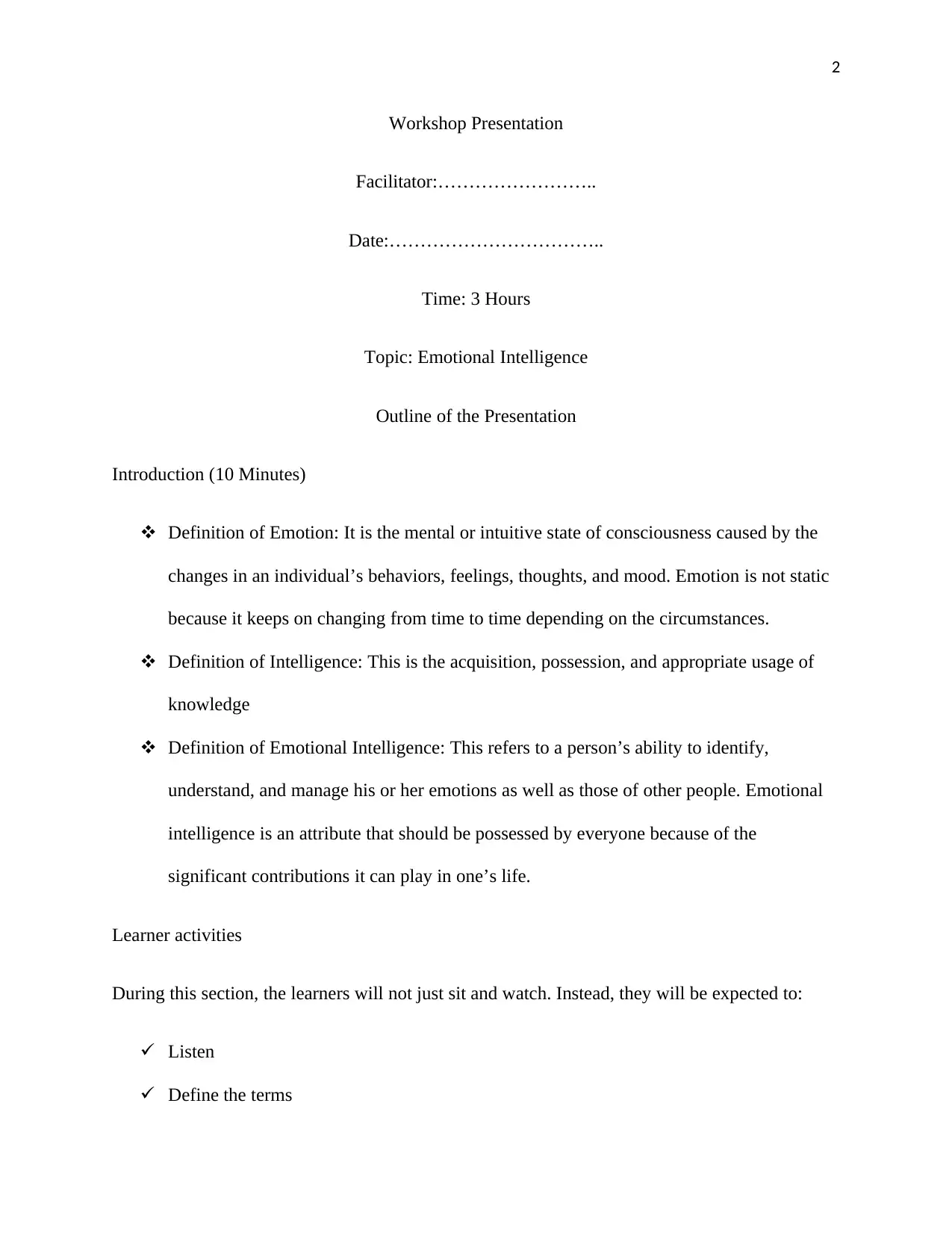
2
Workshop Presentation
Facilitator:……………………..
Date:……………………………..
Time: 3 Hours
Topic: Emotional Intelligence
Outline of the Presentation
Introduction (10 Minutes)
Definition of Emotion: It is the mental or intuitive state of consciousness caused by the
changes in an individual’s behaviors, feelings, thoughts, and mood. Emotion is not static
because it keeps on changing from time to time depending on the circumstances.
Definition of Intelligence: This is the acquisition, possession, and appropriate usage of
knowledge
Definition of Emotional Intelligence: This refers to a person’s ability to identify,
understand, and manage his or her emotions as well as those of other people. Emotional
intelligence is an attribute that should be possessed by everyone because of the
significant contributions it can play in one’s life.
Learner activities
During this section, the learners will not just sit and watch. Instead, they will be expected to:
Listen
Define the terms
Workshop Presentation
Facilitator:……………………..
Date:……………………………..
Time: 3 Hours
Topic: Emotional Intelligence
Outline of the Presentation
Introduction (10 Minutes)
Definition of Emotion: It is the mental or intuitive state of consciousness caused by the
changes in an individual’s behaviors, feelings, thoughts, and mood. Emotion is not static
because it keeps on changing from time to time depending on the circumstances.
Definition of Intelligence: This is the acquisition, possession, and appropriate usage of
knowledge
Definition of Emotional Intelligence: This refers to a person’s ability to identify,
understand, and manage his or her emotions as well as those of other people. Emotional
intelligence is an attribute that should be possessed by everyone because of the
significant contributions it can play in one’s life.
Learner activities
During this section, the learners will not just sit and watch. Instead, they will be expected to:
Listen
Define the terms
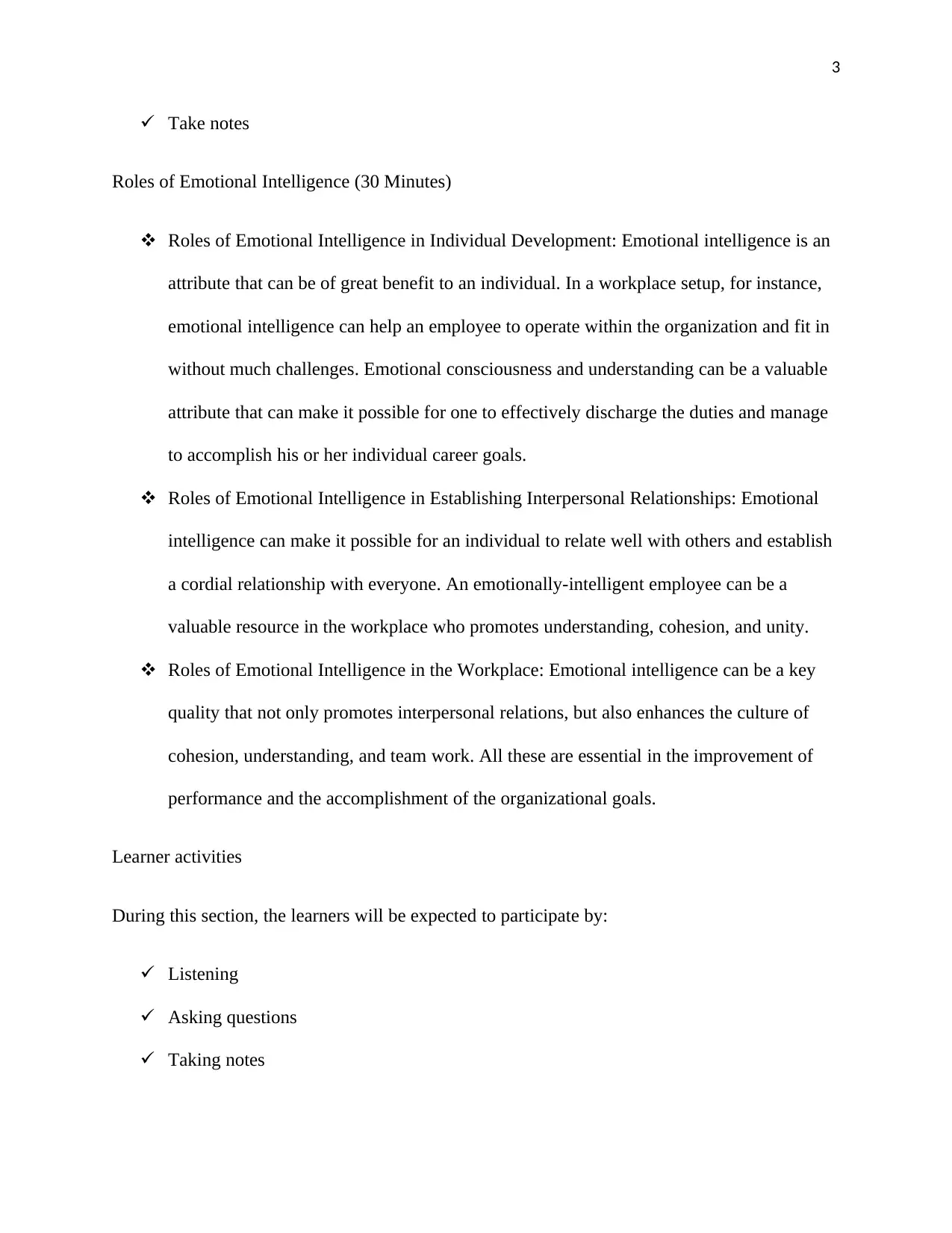
3
Take notes
Roles of Emotional Intelligence (30 Minutes)
Roles of Emotional Intelligence in Individual Development: Emotional intelligence is an
attribute that can be of great benefit to an individual. In a workplace setup, for instance,
emotional intelligence can help an employee to operate within the organization and fit in
without much challenges. Emotional consciousness and understanding can be a valuable
attribute that can make it possible for one to effectively discharge the duties and manage
to accomplish his or her individual career goals.
Roles of Emotional Intelligence in Establishing Interpersonal Relationships: Emotional
intelligence can make it possible for an individual to relate well with others and establish
a cordial relationship with everyone. An emotionally-intelligent employee can be a
valuable resource in the workplace who promotes understanding, cohesion, and unity.
Roles of Emotional Intelligence in the Workplace: Emotional intelligence can be a key
quality that not only promotes interpersonal relations, but also enhances the culture of
cohesion, understanding, and team work. All these are essential in the improvement of
performance and the accomplishment of the organizational goals.
Learner activities
During this section, the learners will be expected to participate by:
Listening
Asking questions
Taking notes
Take notes
Roles of Emotional Intelligence (30 Minutes)
Roles of Emotional Intelligence in Individual Development: Emotional intelligence is an
attribute that can be of great benefit to an individual. In a workplace setup, for instance,
emotional intelligence can help an employee to operate within the organization and fit in
without much challenges. Emotional consciousness and understanding can be a valuable
attribute that can make it possible for one to effectively discharge the duties and manage
to accomplish his or her individual career goals.
Roles of Emotional Intelligence in Establishing Interpersonal Relationships: Emotional
intelligence can make it possible for an individual to relate well with others and establish
a cordial relationship with everyone. An emotionally-intelligent employee can be a
valuable resource in the workplace who promotes understanding, cohesion, and unity.
Roles of Emotional Intelligence in the Workplace: Emotional intelligence can be a key
quality that not only promotes interpersonal relations, but also enhances the culture of
cohesion, understanding, and team work. All these are essential in the improvement of
performance and the accomplishment of the organizational goals.
Learner activities
During this section, the learners will be expected to participate by:
Listening
Asking questions
Taking notes
⊘ This is a preview!⊘
Do you want full access?
Subscribe today to unlock all pages.

Trusted by 1+ million students worldwide
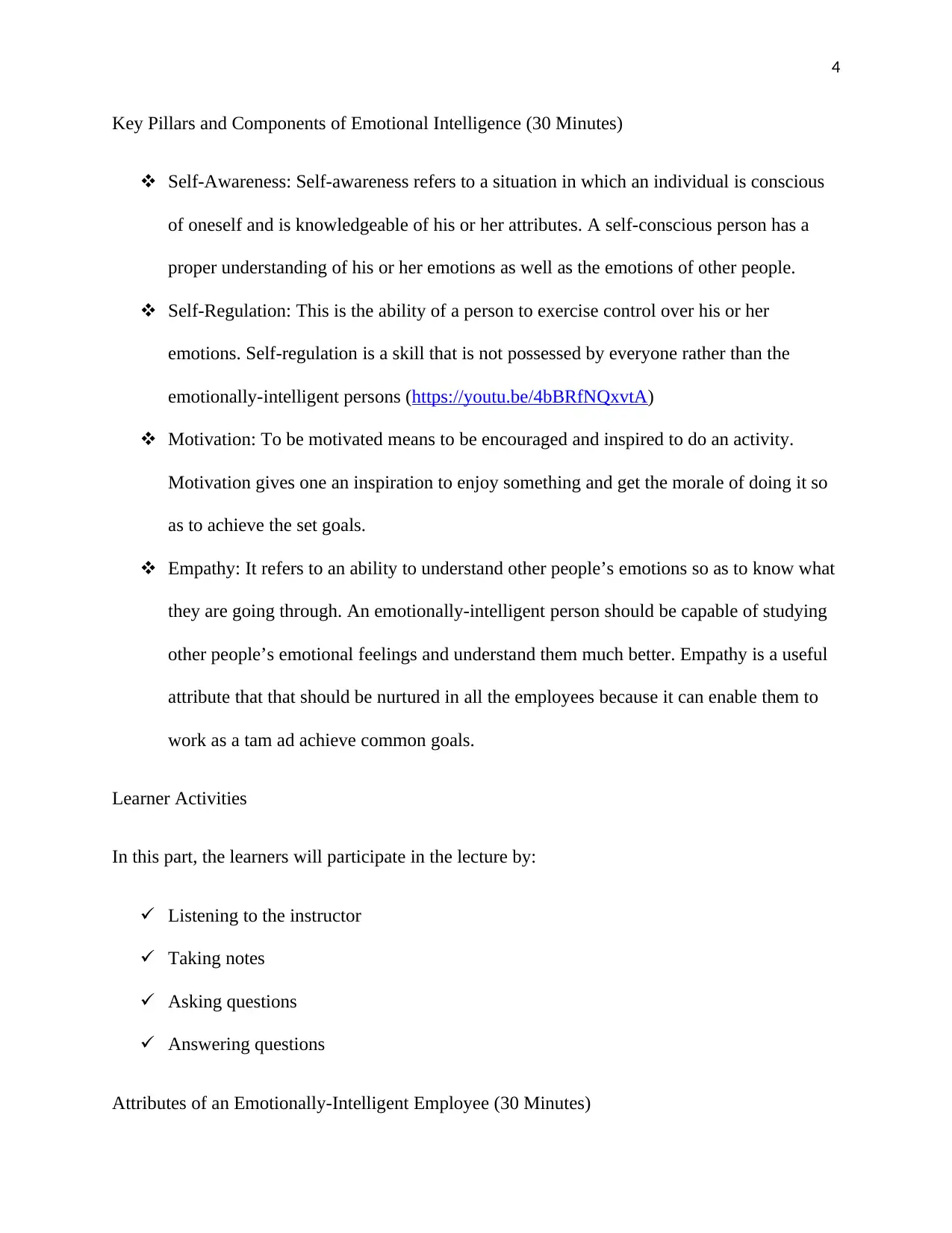
4
Key Pillars and Components of Emotional Intelligence (30 Minutes)
Self-Awareness: Self-awareness refers to a situation in which an individual is conscious
of oneself and is knowledgeable of his or her attributes. A self-conscious person has a
proper understanding of his or her emotions as well as the emotions of other people.
Self-Regulation: This is the ability of a person to exercise control over his or her
emotions. Self-regulation is a skill that is not possessed by everyone rather than the
emotionally-intelligent persons (https://youtu.be/4bBRfNQxvtA)
Motivation: To be motivated means to be encouraged and inspired to do an activity.
Motivation gives one an inspiration to enjoy something and get the morale of doing it so
as to achieve the set goals.
Empathy: It refers to an ability to understand other people’s emotions so as to know what
they are going through. An emotionally-intelligent person should be capable of studying
other people’s emotional feelings and understand them much better. Empathy is a useful
attribute that that should be nurtured in all the employees because it can enable them to
work as a tam ad achieve common goals.
Learner Activities
In this part, the learners will participate in the lecture by:
Listening to the instructor
Taking notes
Asking questions
Answering questions
Attributes of an Emotionally-Intelligent Employee (30 Minutes)
Key Pillars and Components of Emotional Intelligence (30 Minutes)
Self-Awareness: Self-awareness refers to a situation in which an individual is conscious
of oneself and is knowledgeable of his or her attributes. A self-conscious person has a
proper understanding of his or her emotions as well as the emotions of other people.
Self-Regulation: This is the ability of a person to exercise control over his or her
emotions. Self-regulation is a skill that is not possessed by everyone rather than the
emotionally-intelligent persons (https://youtu.be/4bBRfNQxvtA)
Motivation: To be motivated means to be encouraged and inspired to do an activity.
Motivation gives one an inspiration to enjoy something and get the morale of doing it so
as to achieve the set goals.
Empathy: It refers to an ability to understand other people’s emotions so as to know what
they are going through. An emotionally-intelligent person should be capable of studying
other people’s emotional feelings and understand them much better. Empathy is a useful
attribute that that should be nurtured in all the employees because it can enable them to
work as a tam ad achieve common goals.
Learner Activities
In this part, the learners will participate in the lecture by:
Listening to the instructor
Taking notes
Asking questions
Answering questions
Attributes of an Emotionally-Intelligent Employee (30 Minutes)
Paraphrase This Document
Need a fresh take? Get an instant paraphrase of this document with our AI Paraphraser
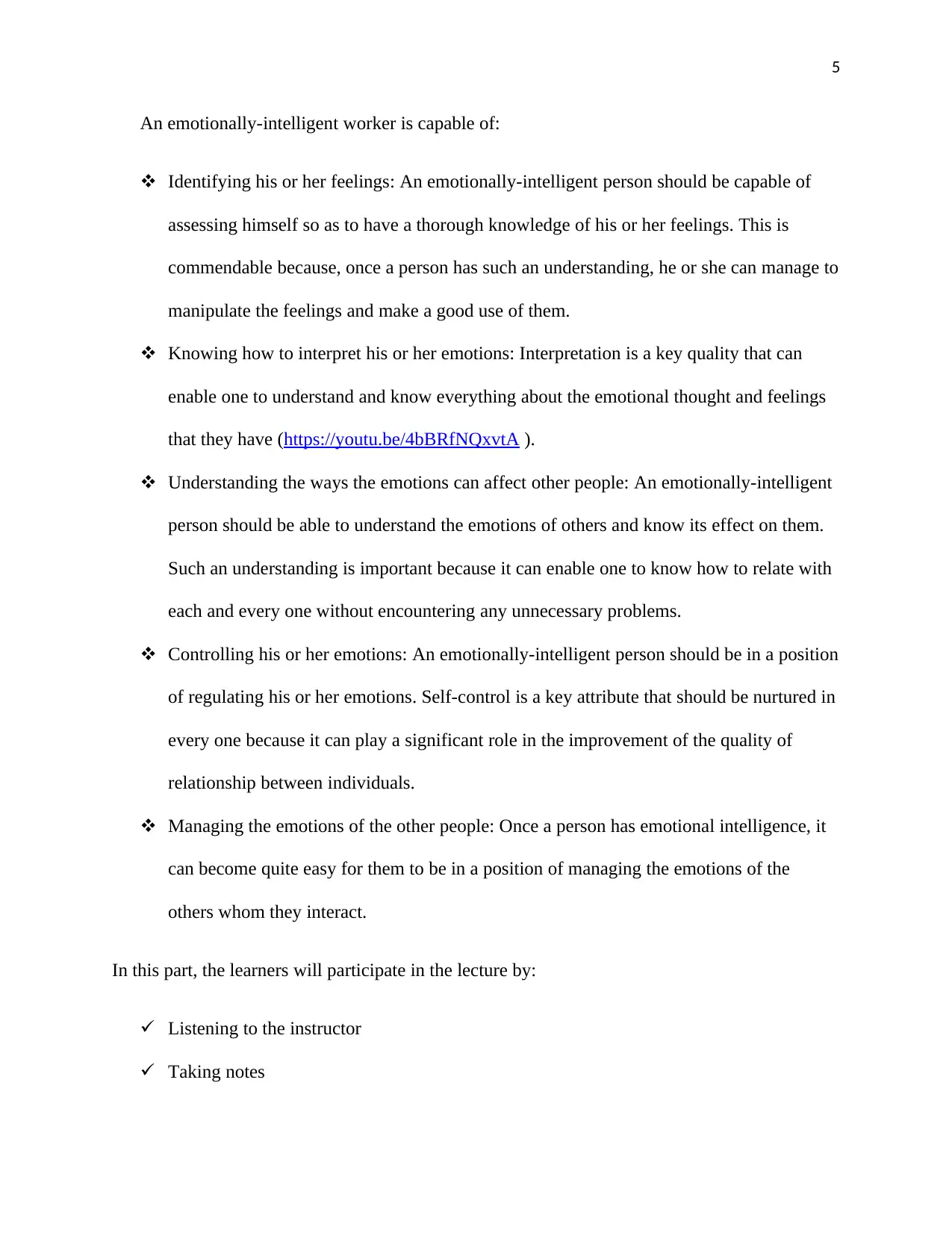
5
An emotionally-intelligent worker is capable of:
Identifying his or her feelings: An emotionally-intelligent person should be capable of
assessing himself so as to have a thorough knowledge of his or her feelings. This is
commendable because, once a person has such an understanding, he or she can manage to
manipulate the feelings and make a good use of them.
Knowing how to interpret his or her emotions: Interpretation is a key quality that can
enable one to understand and know everything about the emotional thought and feelings
that they have (https://youtu.be/4bBRfNQxvtA ).
Understanding the ways the emotions can affect other people: An emotionally-intelligent
person should be able to understand the emotions of others and know its effect on them.
Such an understanding is important because it can enable one to know how to relate with
each and every one without encountering any unnecessary problems.
Controlling his or her emotions: An emotionally-intelligent person should be in a position
of regulating his or her emotions. Self-control is a key attribute that should be nurtured in
every one because it can play a significant role in the improvement of the quality of
relationship between individuals.
Managing the emotions of the other people: Once a person has emotional intelligence, it
can become quite easy for them to be in a position of managing the emotions of the
others whom they interact.
In this part, the learners will participate in the lecture by:
Listening to the instructor
Taking notes
An emotionally-intelligent worker is capable of:
Identifying his or her feelings: An emotionally-intelligent person should be capable of
assessing himself so as to have a thorough knowledge of his or her feelings. This is
commendable because, once a person has such an understanding, he or she can manage to
manipulate the feelings and make a good use of them.
Knowing how to interpret his or her emotions: Interpretation is a key quality that can
enable one to understand and know everything about the emotional thought and feelings
that they have (https://youtu.be/4bBRfNQxvtA ).
Understanding the ways the emotions can affect other people: An emotionally-intelligent
person should be able to understand the emotions of others and know its effect on them.
Such an understanding is important because it can enable one to know how to relate with
each and every one without encountering any unnecessary problems.
Controlling his or her emotions: An emotionally-intelligent person should be in a position
of regulating his or her emotions. Self-control is a key attribute that should be nurtured in
every one because it can play a significant role in the improvement of the quality of
relationship between individuals.
Managing the emotions of the other people: Once a person has emotional intelligence, it
can become quite easy for them to be in a position of managing the emotions of the
others whom they interact.
In this part, the learners will participate in the lecture by:
Listening to the instructor
Taking notes
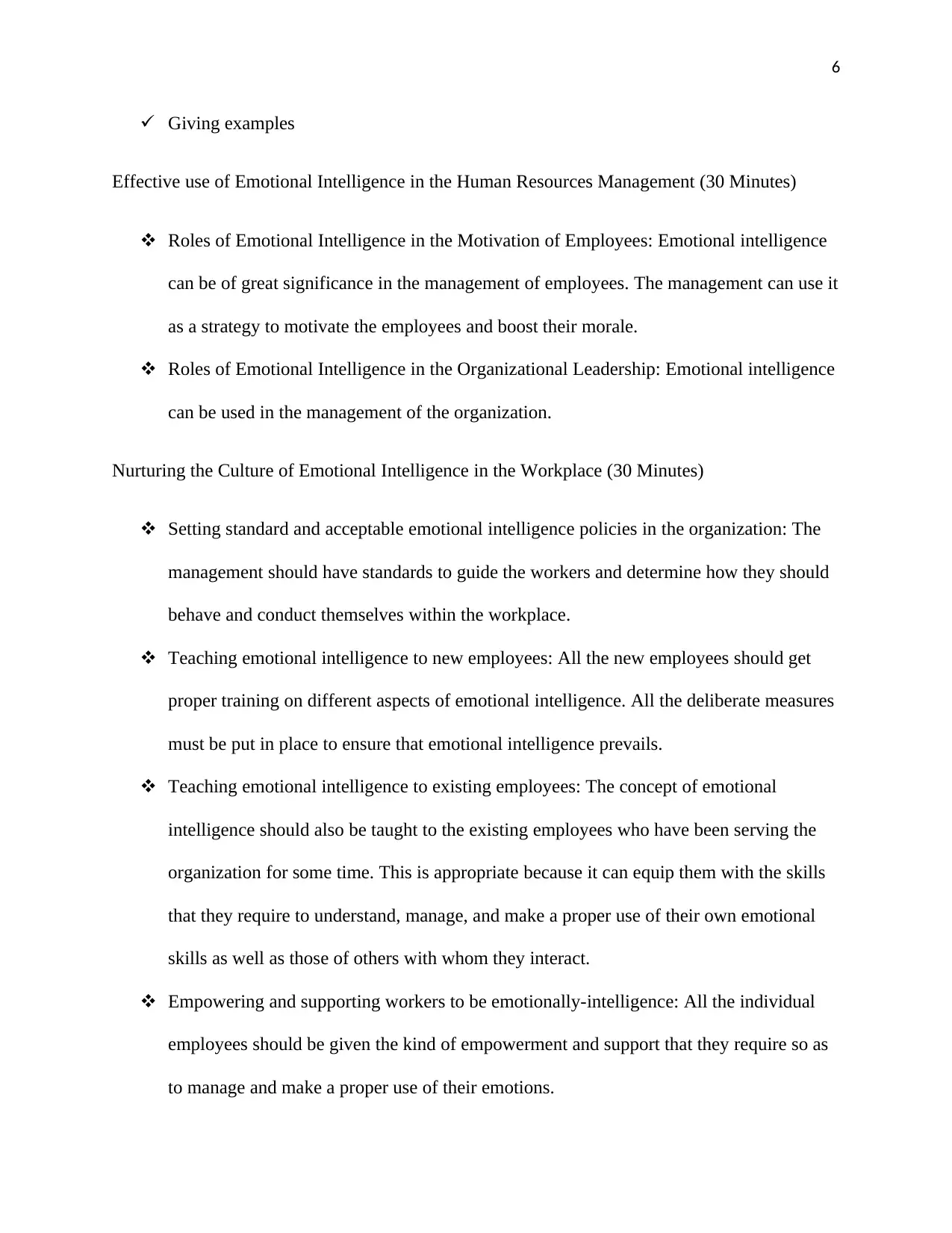
6
Giving examples
Effective use of Emotional Intelligence in the Human Resources Management (30 Minutes)
Roles of Emotional Intelligence in the Motivation of Employees: Emotional intelligence
can be of great significance in the management of employees. The management can use it
as a strategy to motivate the employees and boost their morale.
Roles of Emotional Intelligence in the Organizational Leadership: Emotional intelligence
can be used in the management of the organization.
Nurturing the Culture of Emotional Intelligence in the Workplace (30 Minutes)
Setting standard and acceptable emotional intelligence policies in the organization: The
management should have standards to guide the workers and determine how they should
behave and conduct themselves within the workplace.
Teaching emotional intelligence to new employees: All the new employees should get
proper training on different aspects of emotional intelligence. All the deliberate measures
must be put in place to ensure that emotional intelligence prevails.
Teaching emotional intelligence to existing employees: The concept of emotional
intelligence should also be taught to the existing employees who have been serving the
organization for some time. This is appropriate because it can equip them with the skills
that they require to understand, manage, and make a proper use of their own emotional
skills as well as those of others with whom they interact.
Empowering and supporting workers to be emotionally-intelligence: All the individual
employees should be given the kind of empowerment and support that they require so as
to manage and make a proper use of their emotions.
Giving examples
Effective use of Emotional Intelligence in the Human Resources Management (30 Minutes)
Roles of Emotional Intelligence in the Motivation of Employees: Emotional intelligence
can be of great significance in the management of employees. The management can use it
as a strategy to motivate the employees and boost their morale.
Roles of Emotional Intelligence in the Organizational Leadership: Emotional intelligence
can be used in the management of the organization.
Nurturing the Culture of Emotional Intelligence in the Workplace (30 Minutes)
Setting standard and acceptable emotional intelligence policies in the organization: The
management should have standards to guide the workers and determine how they should
behave and conduct themselves within the workplace.
Teaching emotional intelligence to new employees: All the new employees should get
proper training on different aspects of emotional intelligence. All the deliberate measures
must be put in place to ensure that emotional intelligence prevails.
Teaching emotional intelligence to existing employees: The concept of emotional
intelligence should also be taught to the existing employees who have been serving the
organization for some time. This is appropriate because it can equip them with the skills
that they require to understand, manage, and make a proper use of their own emotional
skills as well as those of others with whom they interact.
Empowering and supporting workers to be emotionally-intelligence: All the individual
employees should be given the kind of empowerment and support that they require so as
to manage and make a proper use of their emotions.
⊘ This is a preview!⊘
Do you want full access?
Subscribe today to unlock all pages.

Trusted by 1+ million students worldwide
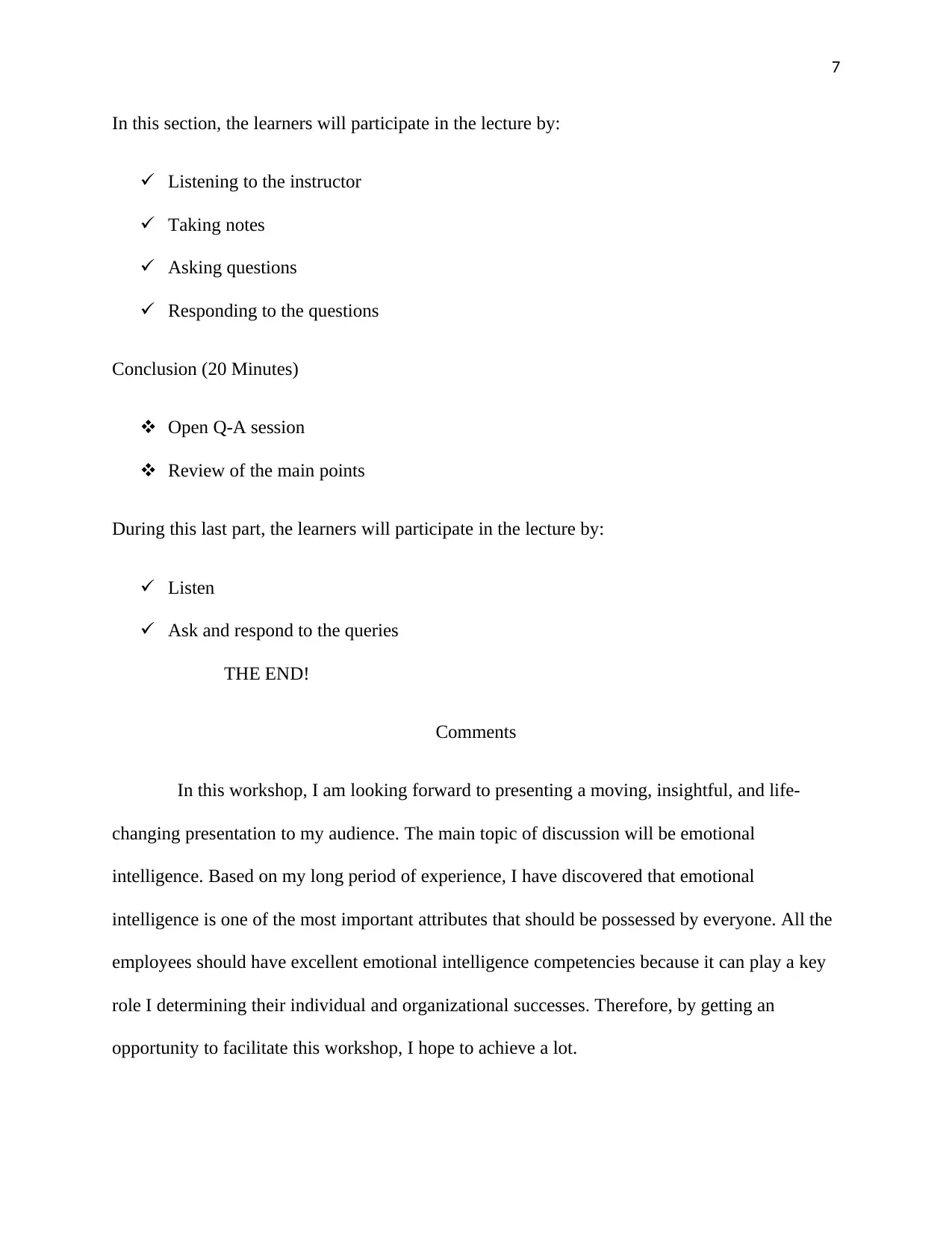
7
In this section, the learners will participate in the lecture by:
Listening to the instructor
Taking notes
Asking questions
Responding to the questions
Conclusion (20 Minutes)
Open Q-A session
Review of the main points
During this last part, the learners will participate in the lecture by:
Listen
Ask and respond to the queries
THE END!
Comments
In this workshop, I am looking forward to presenting a moving, insightful, and life-
changing presentation to my audience. The main topic of discussion will be emotional
intelligence. Based on my long period of experience, I have discovered that emotional
intelligence is one of the most important attributes that should be possessed by everyone. All the
employees should have excellent emotional intelligence competencies because it can play a key
role I determining their individual and organizational successes. Therefore, by getting an
opportunity to facilitate this workshop, I hope to achieve a lot.
In this section, the learners will participate in the lecture by:
Listening to the instructor
Taking notes
Asking questions
Responding to the questions
Conclusion (20 Minutes)
Open Q-A session
Review of the main points
During this last part, the learners will participate in the lecture by:
Listen
Ask and respond to the queries
THE END!
Comments
In this workshop, I am looking forward to presenting a moving, insightful, and life-
changing presentation to my audience. The main topic of discussion will be emotional
intelligence. Based on my long period of experience, I have discovered that emotional
intelligence is one of the most important attributes that should be possessed by everyone. All the
employees should have excellent emotional intelligence competencies because it can play a key
role I determining their individual and organizational successes. Therefore, by getting an
opportunity to facilitate this workshop, I hope to achieve a lot.
Paraphrase This Document
Need a fresh take? Get an instant paraphrase of this document with our AI Paraphraser
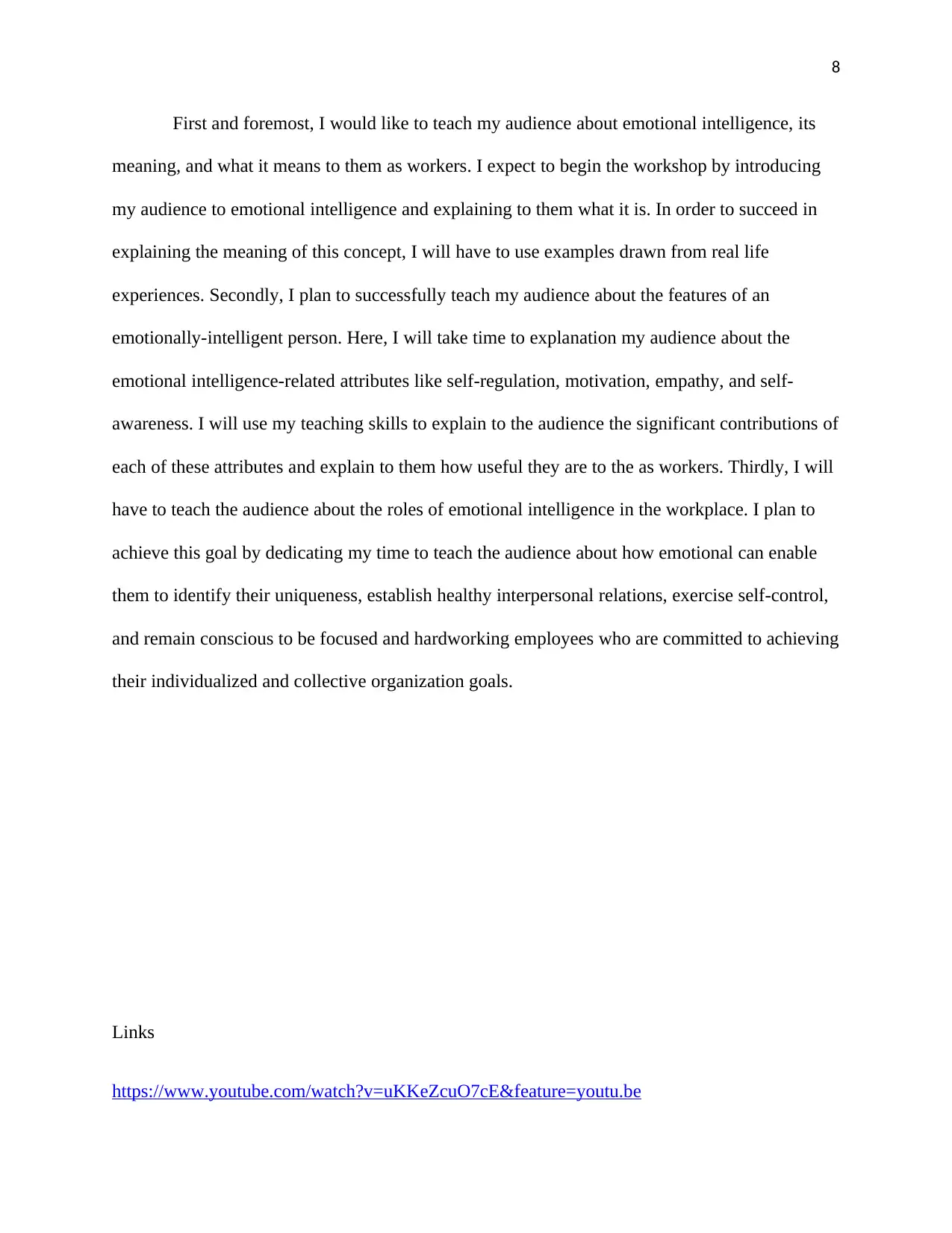
8
First and foremost, I would like to teach my audience about emotional intelligence, its
meaning, and what it means to them as workers. I expect to begin the workshop by introducing
my audience to emotional intelligence and explaining to them what it is. In order to succeed in
explaining the meaning of this concept, I will have to use examples drawn from real life
experiences. Secondly, I plan to successfully teach my audience about the features of an
emotionally-intelligent person. Here, I will take time to explanation my audience about the
emotional intelligence-related attributes like self-regulation, motivation, empathy, and self-
awareness. I will use my teaching skills to explain to the audience the significant contributions of
each of these attributes and explain to them how useful they are to the as workers. Thirdly, I will
have to teach the audience about the roles of emotional intelligence in the workplace. I plan to
achieve this goal by dedicating my time to teach the audience about how emotional can enable
them to identify their uniqueness, establish healthy interpersonal relations, exercise self-control,
and remain conscious to be focused and hardworking employees who are committed to achieving
their individualized and collective organization goals.
Links
https://www.youtube.com/watch?v=uKKeZcuO7cE&feature=youtu.be
First and foremost, I would like to teach my audience about emotional intelligence, its
meaning, and what it means to them as workers. I expect to begin the workshop by introducing
my audience to emotional intelligence and explaining to them what it is. In order to succeed in
explaining the meaning of this concept, I will have to use examples drawn from real life
experiences. Secondly, I plan to successfully teach my audience about the features of an
emotionally-intelligent person. Here, I will take time to explanation my audience about the
emotional intelligence-related attributes like self-regulation, motivation, empathy, and self-
awareness. I will use my teaching skills to explain to the audience the significant contributions of
each of these attributes and explain to them how useful they are to the as workers. Thirdly, I will
have to teach the audience about the roles of emotional intelligence in the workplace. I plan to
achieve this goal by dedicating my time to teach the audience about how emotional can enable
them to identify their uniqueness, establish healthy interpersonal relations, exercise self-control,
and remain conscious to be focused and hardworking employees who are committed to achieving
their individualized and collective organization goals.
Links
https://www.youtube.com/watch?v=uKKeZcuO7cE&feature=youtu.be

9
https://youtu.be/4bBRfNQxvtA
https://youtu.be/4bBRfNQxvtA
⊘ This is a preview!⊘
Do you want full access?
Subscribe today to unlock all pages.

Trusted by 1+ million students worldwide
1 out of 9
Related Documents
Your All-in-One AI-Powered Toolkit for Academic Success.
+13062052269
info@desklib.com
Available 24*7 on WhatsApp / Email
![[object Object]](/_next/static/media/star-bottom.7253800d.svg)
Unlock your academic potential
Copyright © 2020–2026 A2Z Services. All Rights Reserved. Developed and managed by ZUCOL.




